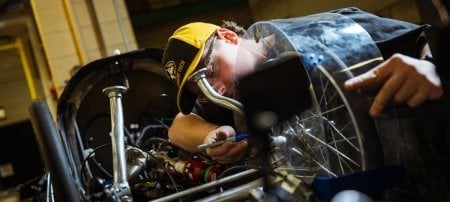Hands Across the Sea—From Michigan Tech to the Middle East and Back

One of Michigan Tech’s goals is to create global awareness on campus. Hundreds of students from around the world study here; students study abroad or serve in the Peace Corps; and faculty members who have experienced the world teach our students. Connecting Michigan Tech to a university across the world is exactly what Nasser Alaraje strived to do while teaching as a Fulbright scholar at Qatar University.
Alaraje is an associate professor in the School of Technology and program chair of electrical engineering technology at Michigan Tech. While he was in Qatar, he taught two sessions of the Embedded Systems course for both male and female Students.
Men and Women Segregated
“The biggest difference in teaching there compared to Michigan Tech is that they have segregated education,” says Alaraje. “The enthusiasm that the women had for engineering, though, was enlightening. About 42 percent of those studying electrical engineering at Qatar University are women – much different than here.” Human development through increased opportunities and support for Qatari women is one of the four pillars of the Qatar National Vision (QNV) 2030.
More than 16,000 students attend the university in the sovereign Middle Eastern country, Qatar, which is in Southwest Asia on the northeastern coast of the Arabian Peninsula. Qatar University is the country’s only national university, but the country has developed Education City – a hub for branch campuses of universities from the United States, United Kingdom and France.
“Teaching in Qatar gives you a different perspective,” says Alaraje. “You are impacted by being in-country, and you take those experiences back.”
Qatar has established its equivalent of the National Science Foundation in 2006, called the Qatar National Research Fund, to support original, competitively selected research that benefits Qatar's vision to become a knowledge-based society. Alaraje responded to the QNRF's call for proposals with a project to establish a vibrant engineering education research center focusing on reconfigurable electronics. The country is prospering, according to Alaraje, and has a goal to become more highly skilled in technology and put more emphasis on higher education.
Partnership with Qatar
In addition to the partnerships Alaraje developed as a Fulbright scholar, he is currently working on an agreement between Michigan Tech’s electrical engineering technology program and the College of North Atlantic (CNA-Q), a technical community college in Qatar and a satellite campus of a Newfoundland-based college. The goals of the articulation agreement are to enable graduates of CNA-Q to pursue their undergraduate degrees at Michigan Tech. “This is a project in progress,” says Alaraje, yet, he seems quite optimistic about future collaborations between prospering Qatar and Michigan Tech.
Michigan Technological University is a public research university founded in 1885 in Houghton, Michigan, and is home to more than 7,000 students from 55 countries around the world. Consistently ranked among the best universities in the country for return on investment, Michigan’s flagship technological university offers more than 120 undergraduate and graduate degree programs in science and technology, engineering, computing, forestry, business and economics, health professions, humanities, mathematics, social sciences, and the arts. The rural campus is situated just miles from Lake Superior in Michigan's Upper Peninsula, offering year-round opportunities for outdoor adventure.




Comments